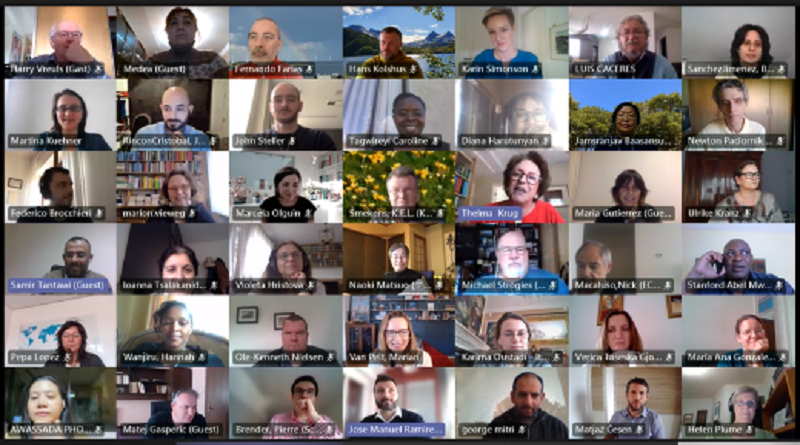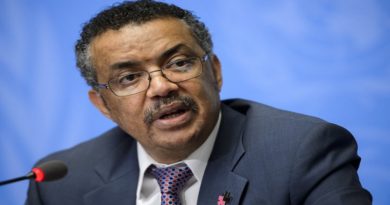Lead Reviewers initiate discussions on implementation of Enhanced Transparency Framework under Paris Agreement
Building on established review practices, Lead Reviewers for the review of Biennial Reports and National Communications met online at the 8th annual meeting from 24 to 26 February 2021 to initiate discussions on the implementation of the Enhanced Transparency Framework under the Paris Agreement.
More than 100 experts from both developed and developing countries attended the virtual meting which provided an opportunity for experienced experts – known as Lead Reviewers – to discuss technical and procedural review issues of Annex I Parties under the Convention, with the aim of ensuring the consistency of reviews across Parties.
Lead reviewers looked ahead to upcoming challenges, such as reviewing the final round of Biennial Reports which will be submitted in 2022, and which should indicate whether the Parties met their 2020 quantified economy-wide emission reduction targets. Lead reviewers also considered the role lead reviewers will play in the Technical Expert Review of the Enhanced Transparency Framework when Parties to the Paris Agreement start to submit their first reports in 2024.
Lead Reviewers of Biennial Reports and National Communications participated in the 8th annual meeting online from 24 – 26 February 2021.
Biennial Reports are produced every two years and submitted to the UNFCCC by developed countries. These reports are then reviewed by a team of international review experts to ensure that countries provide complete and transparent information on their greenhouse gas emissions, their progress toward their 2020 emission reduction targets, and the financial, technological and capacity-building support provided to developing countries. Lead Reviewers, from both developed and developing countries, play a key role in guiding the expert review teams through the review process.
Looking back over the 30 reports that were reviewed in 2020, a trend toward more complete and more transparent reporting is clear, particularly when the latest reports are compared to the first reports submitted in 2014. More countries are meeting the reporting requirements than in the past, and more countries are re-submitting information to fill in any gaps noted by the review teams. As a result, the quality of reporting has improved considerably over time.
In parallel, review experts have worked to ensure that the assessment of country reports is more consistent. Over the three-day meeting, experts honed assessment tools and standardized guidance for review. One example of this is the annually updated “Review Practice Guidance”, a tool which guides reviewers through complex review issues.
Despite recent improvements in reporting, some challenges persist, such as reporting on the estimated impact of policies and measures intended to reduce GHG emissions. These same issues are likely to resurface in Biennial Transparency Reports, which will be submitted starting in 2024, as part of the reporting obligations of the Paris Agreement.
The experience gathered by review experts under the current transparency system, therefore, will help to build the foundation of the Enhanced Transparency Framework, where lead reviewers will continue to play a key role in assessing country reports. This is particularly relevant as the next round of Biennial Reports will assess whether countries met their 2020 emission reduction target, allowing review experts to gain critical insights that can be applied when looking at countries’ progress toward Nationally Determined Contributions (NDCs) under the Paris Agreement.
Using interactive surveys during the meeting, Lead Reviewers also provided feedback on expectations for future reviews, current processes which are working well and may be adapted for future use, and how the secretariat can support reviewers in preparing for future reviews. A new resource produced by the secretariat to enhance understanding of the ETF, the Reference Manual for the Enhanced Transparency Framework, has been made publicly available on the UNFCCC website.
Through interactive surveys, Lead Reviewers shared expectations for transitioning the Enhanced Transparency Framework of the Paris Agreement
On a lighter note, the meeting also highlighted the critical role that lead reviewers play in supporting transparency processes. The annual Lead Reviewer awards recognized the dedication, commitment, team spirit and leadership involved in making the latest reviews successful, particularly given the challenge of conducting the reviews virtually. The full list of award winners can be found here.
In line with the UNFCCC’s efforts to ensure sustainability, the 10 award winners were given trophies made of certified sustainably harvested wood and the shipping of each award was offset through tree planting efforts.
Lead review award winner
In the words of one recipient, Christoph Streissler from Austria, who was recognized for going the “extra mile” in support of the review process: “I am deeply moved, but the prize really goes to you – all the experts on the team – because it was a team effort. This is particularly important in these strange times, when we did not meet personally, and we may tend to forget that we worked as a team.”
Maria Ana Gonzalez Casartelli from Argentina, upon receiving an award for her dedication to the review process noted: “It is a great honour to receive the award for Commitment this year. It makes me very proud to be a lead reviewer in this process and to contribute to the critical work of combating climate change.”
The review of the remaining eleven fourth Biennial Reports will conclude in March 2021. Countries will then participate in the Multilateral Assessment in 2021.
Asset owners with




